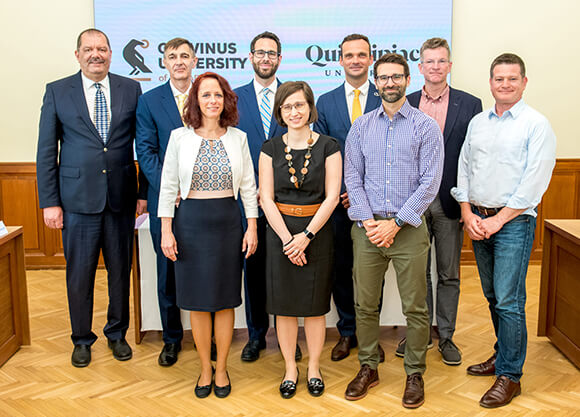
Quinnipiac, Corvinus University of Budapest formalize, expand partnership
June 28, 2022

June 28, 2022

The formalized partnership will create greater synergy between Quinnipiac and Corvinus, a Hungarian university lauded for its social science and business programming, said Chris Ball, director of the Central European Institute and István Széchenyi Chair in International Economics at Quinnipiac.
Quinnipiac hosted Corvinus Executive MBA students for annual visits since 2009 (though currently on pause due to COVID-19), and Corvinus hosted Quinnipiac MBA students for short trips from 2008 to 2016.
“They have outstanding political science, international relations, economics faculty, and programs. Additionally, Corvinus is building new programs in data science that look like good partners for our new data science programs,” said Ball.
Corvinus also offers master’s and doctorate programs not available at Quinnipiac, and may offer development opportunities for future master’s programs in similar areas, he said. The goal is to begin enrolling Quinnipiac students at Corvinus for the Spring 2023 semester.
“Both universities have gone and are undergoing changes in order to enable our graduates to flourish undeterred by the challenges of the 21st century,” said Tamás Pesuth, Rector’s High Commissioner for International Relations at Corvinus. “This international partnership allows our students and faculty alike to learn and cooperate in ways we wouldn’t be able to regionally and therefore, it is of utmost importance that we combine our universities’ talents."
Ball, Dean of the College of Arts and Sciences Adam Roth, Executive Director of the Albert Schweitzer Institute Sean Duffy, and Assistant Professor of Economics and Data Science Jesse Kalinowski traveled to Hungary earlier this month to sign the MOU.
During the trip, the group joined 10 Quinnipiac alumni and three students participating in summer internships for a small alumni reception at the Budapest home of Quinnipiac Trustee Christian Sauska.
International employment opportunities for Quinnipiac students are another exciting faction of the university expanding its presence, as Hungarian American Chamber of Commerce, Morgan Stanley, Citi, Tata Consulting Services and IBM in Hungary have expressed interest, said Ball.
“The companies are open to providing internships, talks with students, guidance on global careers at multinationals, and supporting Quinnipiac curriculum development as appropriate,” said Ball. “The idea is that already this spring, Quinnipiac students who come to Hungary to study will have an option to stay longer and work part-time during the semester then spend June and July working at one of the multinationals full-time.
Participating companies will also provide mentors, and students will be included in special programs and networking events.
For policy-oriented students, there will be internship opportunities at research institutes around topics like migration, international human rights, minority rights, and environmental policy at research institutes and the Fulbright Commission in Hungary, he said.
“Once we can get groups of students coming regularly, we can build additional, unique opportunities in Hungary for Quinnipiac students. I think the experience is valuable especially for American students,” said Ball. “Hungary is a small country and understanding the challenges smaller countries face is eye-opening for Americans who come from a global superpower. In general, it helps them gain a more international perspective on their own lives and careers.”
Quinnipiac Today is your source for what's happening throughout #BobcatNation. Sign up for our weekly email newsletter to be among the first to know about news, events and members of our Bobcat family who are making a positive difference in our world.
Sign Up Now